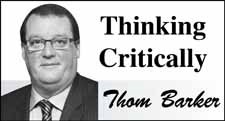I might be on the verge of becoming a modern version of a Luddite.
Last week, I ran across a story that Facebook wants to add a "feature" to its smartphone app that would allow it to use our phone's microphone to listen in on our environment and post updates for us based on the context it derives from the sounds.
It's scary enough to think the technology has become advanced enough to discern that, say, I am watching an episode of Person of Interest-I use the example very purposefully-but that they want us to give up that level of privacy, and millions will, is downright frightening.
Meanwhile, Google is pushing the boundaries of machine consciousness with its Google Glass product. With the vast amount of data that company has accumulated (think Google Street View and Google Earth) and burgeoning technologies, such as facial recognition, it is not hard to envision a not too distant dystopian future where nothing is private.
I am reaching a point that I just don't know enough about technology to be comfortable with it. It is especially uncomfortable because a little more than a decade ago, I probably knew more about it than 99 per cent of people. I used to build and manage secure networks. I went to the big security conferences, even attending the hackers' convention, the Black Hat Briefings, in Vegas one year. I used to attack my own networks to discover their vulnerabilities. Now, I barely know what my own phone is doing behind my back, but I am pretty sure there is way more stuff about me out there in "the cloud" than I would willingly share except by the tacit act of not being able to keep up with the implications of my online activities any more.
And it is not just the social media and apps we use that are collecting data on us. Every bank, retailer, hotel, credit card company and charity organization we deal with have stores of information on our consumer habits.
All of this is couched in the beneficence of personalizing our experience of the world and making everything more convenient. Maybe I am just getting old, but I don't want to live in a Minority Report world where even billboards change their message to suit my perceived consumerism.
Even political parties probably know more about us than we would probably want them to. The Conservative CIMS database contains information about millions of Canadians, and not just their own members and donors, derived from various sources. If you've ever had a phone call from them or seen a campaigner on the doorstep and told them you'd rather eat nails that vote for them it's in there. Even if you've never had direct contact, they still may have information like age, gender, living arrangement, religious affiliation and what tree-hugging organization you belong to that helps them target whether you are worth the time to court.
The NDP's system is almost as sophisticated and, although the Liberals are playing catch up, they are in the game too.
What is worse, is the political parties are specifically exempt from both the Privacy Act that governs what information governments and government organizations can collect about you and the Personal Information and Protection of Electronic Documents Act that regulates the private sector.
I always get a little bit of a chuckle out of people who opt to go "off the grid," not in a bad way, it just seems a little quirky. But with all of issues surrounding privacy these days, particularly the revelations about our own government spying on us in public places and requesting subscriber data from our ISPs without a warrant, the off-the-grid crowd may be the sanest among us.
I probably won't do anything that drastic, but don't be surprised if I disappear from social media. I just don't think I know enough any longer to be a responsible user of communications technology.




